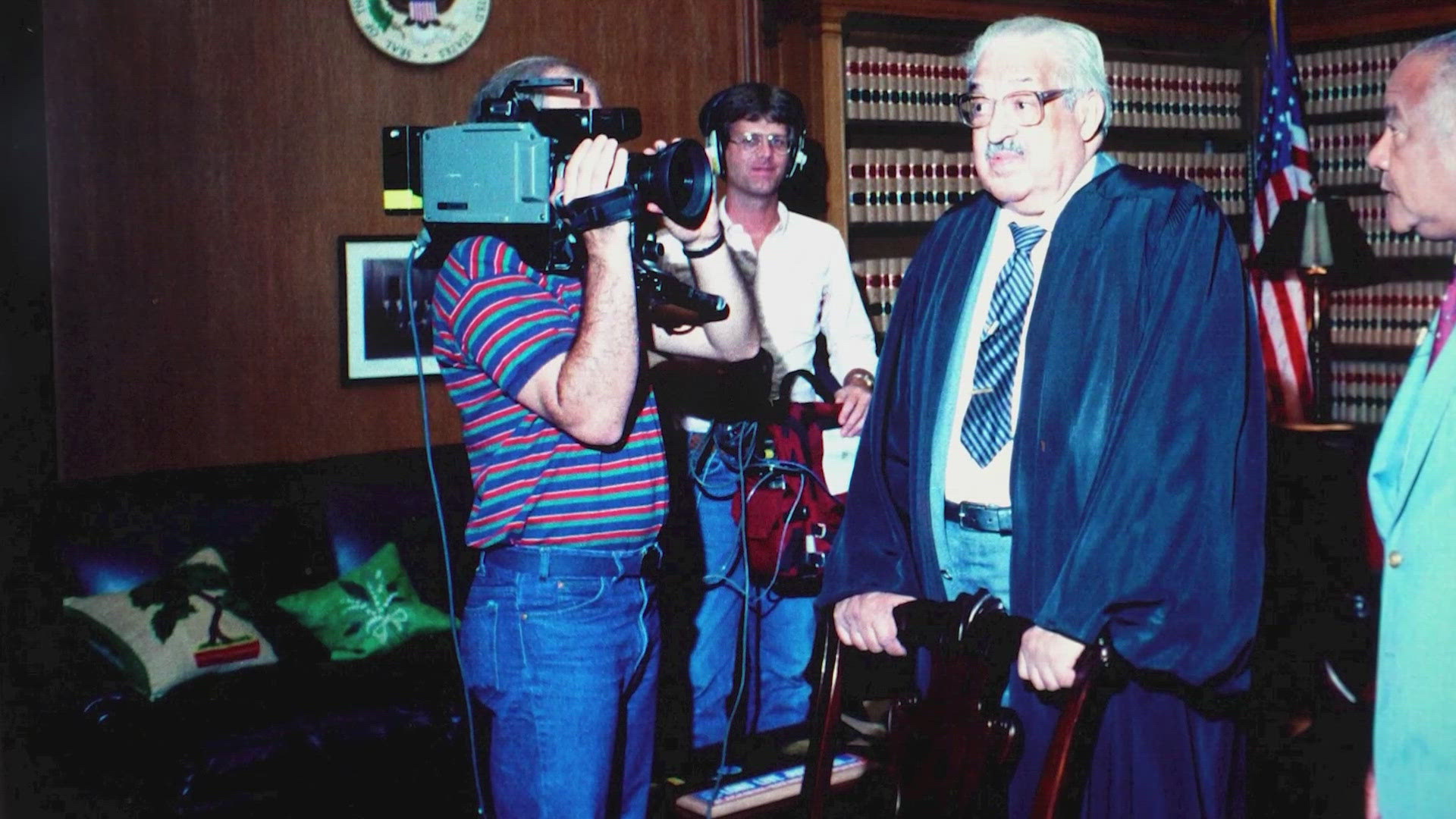WASHINGTON — Supreme Court justices rarely grant interviews and usually shy away from openly political comments.
But as we celebrate Channel 9's 75 years of broadcasting, we're turning the clock back to 1987, and a remarkable documentary that landed WUSA9 on the front page of newspapers across the country.
"Searching for Justice: Three American Stories" was an incredible scoop for a local TV station. The hour-long documentary marked the bicentennial of the Constitution and broke news on abortion, civil rights and presidential politics.
Some of the Supreme Court cases and issues it probed are still dividing our country today.
“Whoever calls the shots determines whether we have integration, segregation, or decency,” the late Supreme Court Justice Thurgood Marshall told Channel 9 journalist Carl Rowan, perhaps speaking as candidly as any Supreme Court Justice ever in a groundbreaking interview in the Justice's chambers.
Rowan asked Justice Marshall to rank the Presidents he'd dealt with, starting with Franklin Roosevelt. Then he got to the man who was sitting in the White House in 1987.
"What about Ronald Reagan?" Rowan asked. “The bottom," Marshall responded. “Honestly, I think he’s down with Wilson," he continued, comparing Reagan with the noted segregationist, former President Woodrow Wilson, who was the first Southern Democrat to occupy the Oval Office since the Civil War.
Marshall and Rowan were old friends, and the conversation reflected that. “He’s been one of the most popular Presidents in the polls,” Rowan told Marshall about Ronald Reagan, a former actor. “Is he more popular than the average movie star?” the Justice quipped back.
Tyrone Couch was one of the photographers videotaping the interview. Nearly 40 years later and now retired after shooting thousands of stories, Couch says being part of "Searching for Justice was perhaps the work he's ever been part of. "I will never forget this,” he said.
It wasn’t just unusual for a local TV station to get this kind of access, it was incredible for any media outfit to get that kind of access. Marshall even got a Channel 9 camera cleared to shoot video in the room where the justices decide cases (It was empty at the time).
Former senior producer Jeanne Bowers says Rowan worked for as long as 20 years to convince Marshall to talk. “You may know this is the only interview he ever did, since he was appointed to the court in ‘67," she said.
Marshall’s assessment of Ronald Reagan made the front page of the New York Times. “First block on all three network news programs. Stories number one and number two,” Bowers said in a Zoom interview.
Rowan’s talks with the Justice became a best-selling book and won Channel 9 some of broadcast journalism’s biggest awards. But it almost ended before it really got started, after Rowan pushed a little too hard.
“Justice Marshall said, ‘That’s it, get out!’ very harshly. ‘Get out!’ And it was the first and only time I’ve ever been thrown out of an interview,” Bowers said. Rowan, the producers and photographers all slunk out of the court "with our tails between our legs."
It took Rowan months to convince Marshall to let them back in.
On a press tour before the documentary aired – right after 60 Minutes – Rowan told the Washington Post about how long he'd known Marshall.
"Rowan's earliest memory of his friendship with Marshall, he recalled recently, goes back to a visit he paid him in New York in the '50s. Marshall was cooking a beef stew, the recipe calling for a bit of bourbon.
"He put about a third of a bottle in and said, 'Damn, it's too thin,'" said Rowan. "So he added some flour, and then it was too thick. Then he thinned it with bourbon. By the time we finished dinner, the beef wasn't the only thing stewed."
There were more bombshells in the "Searching for Justice" documentary, which looked at three different Supreme Court cases that changed America.
Rowan also interviewed Norma McCorvey, the Jane Roe from the Roe v Wade case that established the Constitutional right to an abortion until the Supreme Court's new conservative majority overturned it in 2022.
“How dare they tell me I couldn’t abort a baby that I didn’t want and couldn’t have control over my own body. That really pissed me off," McCorvey told Rowan about why she'd brought the case.
But up until she talked to Rowan for the documentary, McCorvey had maintained that her pregnancy was the result of a gang rape.
"You were raped while you were in Georgia?” Rowan asked her. There was a very long pause. “No. I wasn’t,” McCorvey finally said. "You were not?" Rowan asked, going very quiet in response to the surprise news. “No, I wasn’t," McCorvey repeated. “So all those stories that go into books and so forth are not true?” Rowan asked. “Yes,” she replied.
“And she says, ‘No I wasn’t,’" photographer Tyrone Couch said, remembering the moment 37 years ago. "And I’m stunned, and I’m sitting behind the camera like, ‘Oh my God.’ I think at that point I push into her face.” he said.
Justice Marshall, who had worked as hard as anyone to "expand the parameters of freedom," in the end was optimistic about America’s future. “Oh we’re going to have our setbacks; it’s bound to happen. But it will work. You’ll never find a better Constitution in history. I know it.”
That kind of journalism takes time and money, but Bowers says it’s worth it. “I think it’s critical. And I think there’s not enough of it today, and we’re all off in our silos and people are not watching things together," she said.
“Channel 9 was a super star station in this city, and I don’t think it will be any different 10 years from now,” said Couch from his retirement home in Anne Arundel County.
75 years of excellence – and impact.

